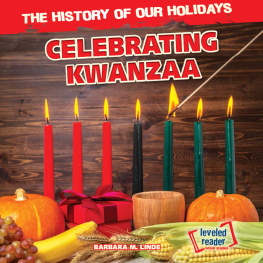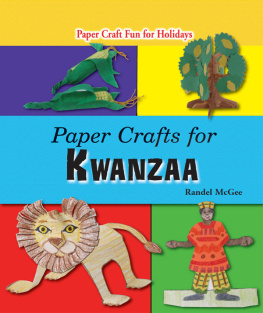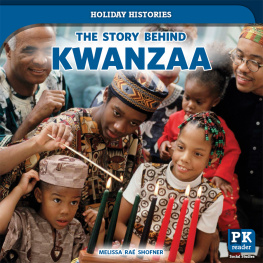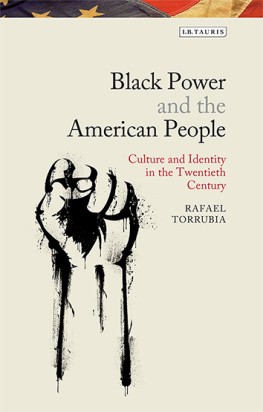A groundbreaking, thorough, and illuminating discourse on Kwanzaa by one of the new leaders in the field. Kwanzaa: Black Power and the Making of the African-American Holiday Tradition is a vital resource that will enrich and enhance the discipline of African-American Studies. A pioneering work about a deeply important holiday.
M.K. Asante, Jr., director of The Black Candle: A Kwanzaa Celebration
Kwanzaa is an important contribution to our understanding of the Black Power movement, cultural nationalism and the history of Kwanzaa it is certain to be the leading text surveying the history of Kwanzaa and its place in the history of African American cultural politics.
Scot Brown, Associate Professor of History, UCLA, author of Fighting for US: Maulana Karenga, the US Organization, and Black Cultural Nationalism
Keith Mayes situates Kwanzaas invention within the black holiday tradition while demonstrating how embedded it was in the cultural nationalism of Black Power. Those wishing to further their understanding of African American holidays and their place in American culture would do well to read this book.
Ellen M. Litwicki, Professor of History, State University of New York at Fredonia, author of Americas Public Holidays, 18651920
Kwanzaa
Since 1966, Kwanzaa has been celebrated as a black holiday traditionan annual recognition of cultural pride in the African-American community. But how did this holiday originate, and what is its broader cultural significance?
Kwanzaa: Black Power and the Making of the African-American Holiday Tradition explores the political beginning and later expansion of Kwanzaa, from its start as a Black Power holiday, to its current place as one of the most mainstream of the black holiday traditions. For those wanting to learn more about this alternative observance practiced by countless African-Americans and how Kwanzaa fits into the larger black holiday tradition, Keith Mayes gives an accessible and definitive account of the movements and individuals that pushed to make this annual celebration a reality, and shows how African-Americans brought the black freedom struggle to the American calendar.
Clear and thoughtful, Kwanzaa: Black Power and the Making of the African-American Holiday Tradition is the perfect introduction to what is now the quintessential African-American holiday.
Keith A. Mayes is Assistant Professor of History and African American & African Studies at the University of Minnesota, Twin Cities.
Kwanzaa
Black Power and the Making of the African-American Holiday Tradition
Keith A. Mayes
First published 2009
by Routledge
270 Madison Ave, New York, NY 10016
Simultaneously published in the UK
by Routledge
2 Park Square, Milton Park, Abingdon, Oxon OX14 4RN
Routledge is an imprint of the Taylor & Francis Group, an informa business
This edition published in the Taylor & Francis e-Library, 2009.
To purchase your own copy of this or any of Taylor & Francis or Routledges collection of thousands of eBooks please go to www.eBookstore.tandf.co.uk.
2009 Taylor & Francis
All rights reserved. No part of this book may be reprinted or reproduced or utilized in any form or by any electronic, mechanical, or other means, now known or hereafter invented, including photocopying and recording, or in any information storage or retrieval system, without permission in writing from the publishers.
Trademark Notice: Product or corporate names may be trademarks or registered trademarks, and are used only for identification and explanation without intent to infringe.
Library of Congress Cataloging in Publication Data
Mayes, Keith A., 1967
Kwanzaa : black power and the making of the African-American holiday tradition / Keith A. Mayes.
p. cm.
Includes bibliographical references and index.
1. KwanzaaUnited StatesHistory. 2. African AmericansSocial life and customs. 3. Black powerUnited States. I. Title.
GT4403.M39 2009
394.26120973dc22 2009001049
ISBN 0-203-87486-2 Master e-book ISBN
ISBN 10: 0-415-99854-9 (hbk)
ISBN 10: 0-415-99855-7 (pbk)
ISBN 10: 0-203-87486-2 (ebk)
ISBN 13: 978-0-415-99854-3 (hbk)
ISBN 13: 978-0-415-99855-0 (pbk)
ISBN 13: 978-0-203-87486-8 (ebk)
FOR
DENISE
MYLES
MARCUS
Illustrations
Every effort has been made to cite completely and fairly the original source for each work included in this book. In the event that something has been inadvertently used or cited incorrectly, every effort will be made in subsequent editions to rectify the error. We offer our sincere thanks to all of the sources that were courteous enough to help us reproduce the images in this volume.
CHAPTER 2
Maulana Karenga teaching Swahili in Los Angeles, 1965. Courtesy of Library of Congress, Prints & Photographs Division, Look Magazine Photograph Collection, LC-L9-66-2755-W
CHAPTER 3
Childrens Kwanzaa celebration in school. Courtesy of Library of Congress, Prints & Photographs Division, Look Magazine Photograph Collection, LC-L9-695396-II
Karamu Ya Imani held in Chicagoone of the largest public Kwanzaa celebrations during the 1970s. Courtesy of Mansong Kulubally
Some Positive Party Organization promoting pre-Kwanzaa Workshop in 1980 in Jacksonville, Florida. Courtesy of Mansong Kulubally
CHAPTER 4
Kinara made by Ngoma Ali of Los Angeles; Ali is one of a handful of black kinara manufacturers in the United States. Courtesy of Keith Mayes
Billboard in Minneapolis, Minnesota promoting the largest Twin Cities annual Kwanzaa celebration at Pantages Theater. Courtesy of Mikiesha Terrell
CHAPTER 5
King Week 82 flyer in Atlanta, Georgia. Courtesy of Ayo Handy-Kendi
Malcolm X Day flyer in New York City, 1979. Courtesy of Ayo Handy-Kendi
Ayo Handy, Black Love Day founder, pouring libation during the ceremony. Courtesy of Ayo Handy-Kendi
Kwanzaa kinara and Akoma ritual symbols in the Black Love Day ceremony. Courtesy of Ayo Handy-Kendi
Acknowledgments
Writing a book is never a sole endeavor. I have incurred many debts over the years as this enterprise has passed through the various stages. First and foremost, I would like to thank my dissertation advisor, former Edwards Professor of History, Nell Irvin Painter of Princeton University, now retired from teaching but whose graduate seminar, Social History led me to choose the topic Kwanzaa. Not only did Nell allow me to engage my seminar colleagues about Kwanzaa and other ways African-Americans remembered the past, but dared me to take the subject up as a dissertation topic. I would also like to thank current and former members in Princetons History Department who helped shape the project in its infancy, notably the dissertation committee Dan Rodgers, Colin Palmer, William Van Deburg (outside reader) from the University of WisconsinMadison. A special thanks to Bill Jordan for teaching the Mellon summer dissertation seminar and for the laughs on the softball field about my continuous overstatement of Kwanzaa celebrants. Thank you to Stan Katz of Princeton Universitys Woodrow Wilson School and Director of the Center for Arts and Cultural Policy Studies, also Liz Lunbeck, Dirk Hartog, Tera Hunter, Kevin Kruse, Sheldon Garon, and Christine Stansell. Thank you to the Princeton Center for African American Studies and its faculty, Noliwe Rooks, Al Raboteau, Eddie Glaude and Cornel West. I also would like to thank my graduate student colleagues for six years of fun and commiseration: Cheryl Hicks, Sam Roberts, Nicole Sackley, Jesse Hoffnuff-Goskoff, Todd Stevens, Crystal Feimster, Barbara Krauthamer, Ken Mack, David Silverman, James Wilson, Jarbel Rodriguez, Chad Williams, Anastasia Curwood, Madeline Lopez, Sara Igo, Tammy Brown, and Eric Love. Equally important were colleagues in other departments that evolved into lasting friendships: Andrea Morris (molecular biology), Tariq al-Jamil (religion), Kevin Jones (Woodrow Wilson School of Public Policy), Elaine Bonner-Tompkins (Woodrow Wilson School) and her husband and very dear friend of mine from Columbia Universitys School of Social Work, Dr. Willie Tompkins, who keeps me laughing on a weekly basis about our New York upbringing and the twist and turns of our lives (or I should say mine).








